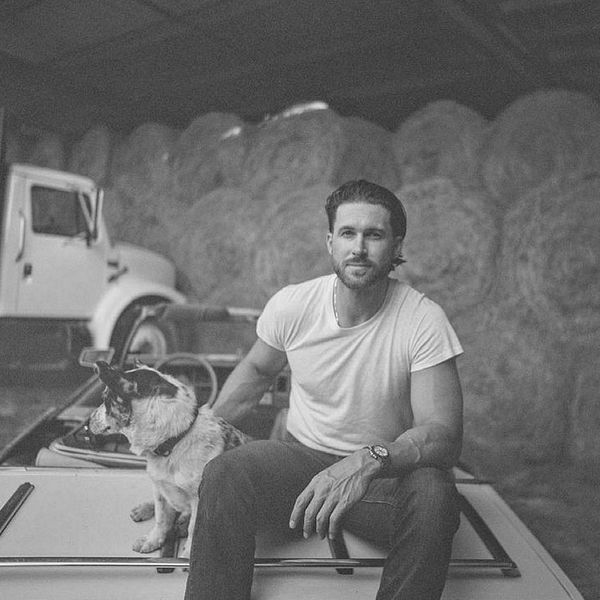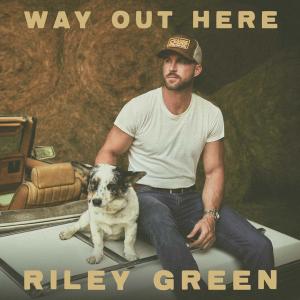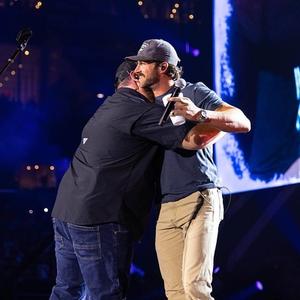
Interview: Riley Green Discusses the Story Behind ‘Jesus Saves’, ‘Way Out Here’ EP and More
By Maxim Mower




Link copied

There was a time when Riley Green fans would have to be content feeding on scraps, with the Alabama singer-songwriter dropping a smattering of singles here and there, in addition to the occasional EP. Now, however, Riley sits down with Holler off the back of releasing his second studio project in the space of just six months.
After the widespread acclaim that met Riley Green's sophomore album, Ain't My Last Rodeo, many artists would've rested on their laurels and drip-fed singles to Country Radio over the next year or two. Riley, though, immediately returned to the writing room, taking to Instagram to tease a new ballad, ‘Jesus Saves’, soon after.
The intricate, downcast offering tells the powerful tale of Riley Green stopping to spend some time with a homeless man he usually drives past. As his tragic story unfurls, it would've been easy for each harrowing detail to plunge ‘Jesus Saves’ into trite or indulgent territory. But the sincerity of both the penmanship and the delivery ensures ‘Jesus Saves’ lands each emotional sucker punch it swings for.
The evocative nature of the track, which serves as the keystone of Way Out Here, inevitably makes you wonder whether Riley drew on real-life experience for ‘Jesus Saves’.
“Well, the thought is a true story”, the ‘Different ‘Round Here’ hitmaker explains, “It was me passing the same guy on the same corner in Nashville, and just thinking he's got one little piece of cardboard to try to tell people his story, and why they should stop and hear him out and lend a hand. I guess it's just the message of you never know what somebody's been through. I thought that was a really positive message. So I just sat down and tried to write that from a standpoint of somebody that's had a lot of things happen to him that got him to the place he is now”.
Riley Green's rustic, rugged and rurally inspired catalogue is often geared towards celebrating the Southern lifestyle, as is epitomised on the new EP's title-track. While this remains the primary muse for Riley, ‘Jesus Saves’ is a reminder that it's an oversimplification to reduce his music purely to this. Both Ain't My Last Rodeo and Way Out Here are underpinned by a deep reverence of the craft of classic country storytelling, something Riley showcases on the sultry ‘Pick A Place’ and the playful, but deceptively heartbroken, ‘Damn Good Day To Leave’.
As Riley Green's sonic recipe expands to include the Buffett-esque ‘Good Morning From Mexico’ and the steamy ‘Worst Way’, the secret ingredient that glues it all together is Riley's dedication to authenticity when it comes to portraying his way of life.
Although Riley's status as the flag-bearer of traditional, Southern country is a privilege, he would be forgiven if he sometimes struggled with the weight of expectation that comes with this. He brushes this off, “It's kind of the opposite. It's really given me a pathway into having a career in country music. It's never like I was trying to write these songs about where I grew up - I just ended up writing songs about that, and it turns out a lot of folks grew up the same way. I think a lot of people feel prideful about where they're from, no matter where it is, but certainly people can relate that are from the south. It comes pretty natural for me”.
Many view country music as becoming increasingly diluted, due to the accelerating infusion of Pop, Hip Hop, Folk and Indie artists and textures into the genre of late.
As a result, swathes of fans are championing Riley Green's discography as the perfect equaliser, “It's definitely a compliment to be called ‘traditional country music’ or ‘country’ in any way. There's room for a lot of different types of music in the country world. But at the same time, if there's a way I can keep some of that traditional sound involved in the music coming out, and even introduce that sound to some of the younger generations, that's a pretty cool thing to be able to do. My granddaddy introduced me to Roy Acuff, Merle Haggard and George Jones, and if any of that can come through in my music, I think that's a pretty cool thing”.
Riley Green undoubtedly soaks his instrumentation and lyricism in the waters of ‘50s, ‘60s and ‘70s country music, but he also grounds his songs in a modern-day context.
It doesn't feel as though he's transporting you to that period, rather, Riley situates himself in the same boat as many of today's classic country aficionados - wistfully and longingly looking back at that bygone era, and expressing the jarring frustrations of holding onto an ‘old-fashioned’ lifestyle in today's fast-paced world.
While he always takes time to reminisce and reflect in this way, Riley Green also has his sights firmly trained on the horizon - a horizon that looks brighter than ever for fans.
“We're recording the next album, looking at a potential Fall release”, Riley confirms, “There's a lot of new music coming this year. It's a cool time to be out on the road and try some of these new songs...If I write a song I'm excited about or that fans are excited about, I'm gonna record it and try to get it out as soon as I can”.
Although nostalgia for a long-lost age of country music is a strong influence on many of his listeners, 2024 brings with it the golden opportunity to witness a generational talent remoulding, innovating and pioneering his own brand of traditional country music.
Although he yearns for a return to the time of Acuff, Haggard and Jones, fifty years in the future, fans may end up wishing they could return to Riley Green's era of country music.
In addition, Riley Green touched on his decision to re-record Bruce Springsteen's ’Atlantic City’, writing ‘Worst Way’, the recording process for his next album and more:
On re-releasing his cover of ‘Atlantic City’, which originally appeared on his debut ‘County Line’ EP in 2016:
“That was one of my favourite covers to do at shows, and it became like an original song for me. It's obviously a Bruce Springsteen song. The Band had a version of it, Levi Helm had a version of it too that I really liked a lot - my version's a lot more like his.
When I cut it years ago, it was just poor quality. I didn't have any money, I was doing construction work, and I recorded it in some guy's garage. So it was nice to give that song a new life. Fans still know it, and it's cool to be able to go back and cover a song like that”.
On including more light-hearted songs, such as ‘Good Morning From Mexico’, on his EP:
“Now, we're going in and recording for an EP or an album - I'm not just writing songs randomly. It allows you to say, ‘I think this type of song will fit well’, and it makes it a more well rounded project that has a lot of different types of songs on it”.
On writing his second love song, ‘Worst Way’:
“I used to say at shows before playing ‘When She Comes Home Tonight’ that this is my only love song. Now I gotta say, ‘I've got two!’ I'm just trying to write better versions of some of these songs, and stylistically draw on things that have worked for me in the past. I think about it from a live show standpoint - that song fits in well in the show, it's a nice break from the beers-in-the-air ballads”.
On whether older unreleased fan-favourites will be on his next album:
“We've been in the studio and cut about four songs, so we've got a lot of room on the album for what's next. But I think once we start getting close to six, seven or eight songs, and we look at what the album's missing and what those pieces are, I think that's when we'll go back through the catalogue and find those songs that raised their hands through me playing them on socials for fans”.
On hosting his own festival, Duckman Jam:
“I grew up playing the Flora-Bama, I've played over 100 shows there in these small rooms for tips. So to be able to go and play a couple of shows on the beach for a giant crowd like that is really cool - and then also to be able to bring in some of my favourite artists to be a part of it. It's a lot different than just going on tour. It's two days, there's a lot involved in it. It was a fun process to figure out how that works. I look forward to seeing it grow and doing it again in the future”.
On his older fan-favourite, ‘That's My Dixie’:
“It's obviously a tribute to where I grew up, and maybe some of the more misunderstood things that we're prideful about in the south. It was me, Jessi Alexander and Randy Montana, and we all grew up the same way...If you didn't grow up where I grew up, you don't understand that this street is named after this person, and this is this high school is named after that person. That sense of pride comes from a really positive place. It's just about being proud of where you're from”.
For more on Riley Green, see below:





